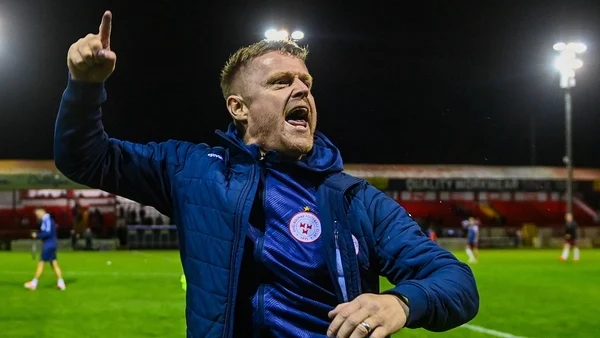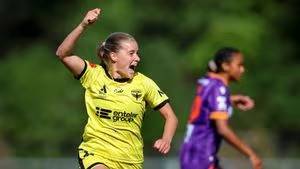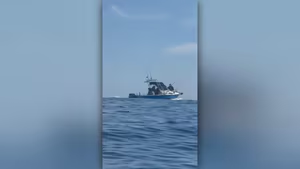The Simpsons first aired 35 years ago on 17 December 1989 with a Christmas special when Shelbourne Football Club manager, Damien Anthony Duff, was ten years old and still asking Santa for a new pair of football boots.
Duff Beer was Homer Simpson's drink of choice.
"Can’t Get Enough of That Wonderful Duff" is its storied slogan and was also a regular Homer Simpson catchphrase.
Those words could also be so true for the League of Ireland.
Damien, the 100 times capped Republic of Ireland international, who won the Premier League twice with Chelsea and served Blackburn Rovers, Newcastle United and Fulham with distinction as well as undertaking coaching roles at Glasgow Celtic and Shamrock Rovers, says that his success with Shelbourne has been the greatest achievement of his career.
And he means it.
His passion for his club and for the League of Ireland in general is utterly authentic and has broken through a glass ceiling of perception and credibility that often hindered the image of the domestic game.
Along with his staff he celebrated Shelbourne’s unlikely league title success hard.
Let’s just say that there might have been a Duff beer or two taken.
On the way to collect his parents and drive them to the Soccer Writers’ Ireland awards banquet just before Christmas where he would collect the trophy for 'Personality of the Year’ his trousers split.
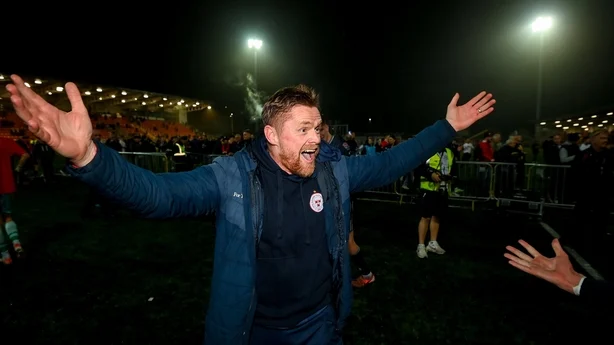
He phoned ahead and asked his mother to get a needle and thread and as she sat in the back seat of the car doing emergency needlework his father took his place in the passenger seat and looked across in shock to see his son dressed only in his underwear ready to ferry them all to the gala lunch.
This was a story Duff told from the stage of the Clontarf Castle dining hall to a room full of Irish football legends - including many members of the famous team from 1974 that beat the USSR - with all the self-deprecating humour and pathos that has characterised his dealings with the Irish media and the wider football public.
He is a compelling character and, for a man who once turned tight lipped at the sight of a post-match microphone, he has used his platform to promote his club and to elevate the League of Ireland to an altogether new level.
His appearance on television channels adds eyeballs, his quotes in newspapers and in online platforms add clicks.
He is, in a modern sense, box office.
But talk is cheap, and talk is just all talk. What matters is that his Shelbourne side delivered a first league title since 2006 in dramatic fashion in the final moments of the final game of the season.
That owed much to the emotional energy he was able to summon that brought a club recently in the doldrums back to life and back to the summit of Irish football.
In his first season in charge three years ago attendances at Tolka Park were poor and the famous old ground was in need of salvation.
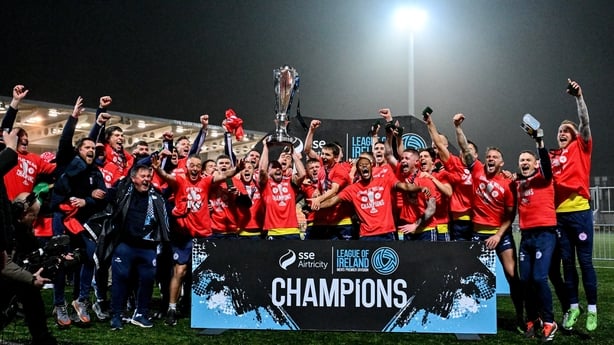
Shelbourne finished seventh that year but rode a wave that brought them to the FAI Cup final where they were beaten 4-0 by Derry.
Something was stirring and Duff, along with his assistant Joey O'Brien, went about strengthening the squad.
But it was not cheque book management, but rather finding players like Mark Coyle, Paddy Barrett or Sean Gannon; players with character and personality that would give their all to the cause.
A link up with Hull City brought Will Jarvis and Harry Wood to Tolka Park and a change of ownership only added to Duff’s hand.
He was the reason that people wanted to get involved in the club and get behind the northside institution.
A strong start this season certainly helped, as well as four times champions Shamrock Rovers’ stuttering early campaign.
Later in the campaign when the ‘yips’ hit Shels, the characters in their squad with the greatest conviction won out and although Jarvis - a huge part of their early season form - had been recalled by Hull, it was Harry Wood who scored the winner at the Brandywell securing the title and ending Shamrock Rovers’ winning streak.
Sean Boyd’s return from the treatment table cannot be underestimated nor can the impact of JJ Lunney whose absence coincided with Shelbourne’s rough patch.
His composure and man of the match display in a memorable night in Derry brought the Dubliners over the line.
And perhaps motivational messages from the likes of José Mourinho which were played to the squad in the function room of the Everglades hotel on the banks of the River Foyle on the afternoon of the showdown might well have brought a little extra something.
Duff and his squad deserved this and their presentation of the trophy to their many younger fans in Tolka the day after the famous night before only added to Duff’s growing legend among a new demographic.
Dressed like he was ready to take the main stage at Glastonbury (sunglasses in November always a good look), Duff has helped shift League of Ireland from the margins towards the mainstream and this 'indie' rock 'n' roll attitude will do them no harm.
The challenge, of course, will be to do it all again, and with Shamrock Rovers proving in Europe just how far Irish football could go with proper investment, the race for honours next season will be keen.
Stephen Bradley may have been tempted by offers from abroad but his commitment and dedication to Shamrock Rovers has been absolute since he took over and his success has been as remorseless as it has been consistent.
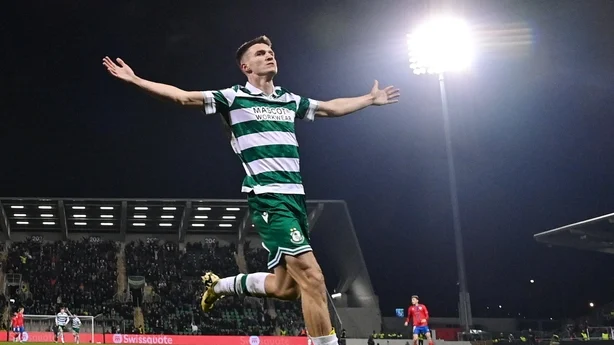
He will lose players, for sure, as he has done before, but he will also prove that he is one of Irish football’s sharpest minds.
Stephen Kenny’s return to the League of Ireland showed in no uncertain terms just how good a manager he is, and his St Patrick's Athletic side might even have gotten over the line had he joined them a week or so earlier in the season.
They will be plotting a tilt at the title in Inchicore and Derry City, who came close last time under Ruaidhrí Higgins, have a new man at the helm in Tiernan Lynch and plenty of ambition.
The Brandywell side were firm favourites to win silverware when they came down to Dublin to take on Drogheda United in the showcase game of the season, the FAI Cup final, but it was Kevin Doherty’s Drogheda United who took all the credit.
The former postman handed in his sack of letters, including his resignation from An Post, in order to go full time with Drogheda and he certainly found a way to turn the fortunes of the Co Louth club around.
In a sense they won two finals in a week - the FAI cup and then a promotion-relegation play-off with Bray Wanderers.
They now have European football and Premier Division football secured for next season.
Their wee county neighbours Dundalk had no such luck.
A horrendous campaign saw the recent champions lose their Premier Division status and one of Ireland’s oldest and most successful clubs almost went bust with debts in excess of €1 million.
The club has changed ownership again much to the alarm of supporters but the hope is that under the watch of John Temple the club can prove its viability.
Ciarán Kilduff, who was a huge part of much of Dundalk’s success under Stephen Kenny, has come from winning a title with Athlone women and will be expected to deliver the First Division for Dundalk’s men.
Shelbourne’s women had a comprehensive cup final success against Kilduff’s charges in a one-sided women’s FAI Cup final in blustery conditions in Tallaght but the story for the Women’s National Team this year is one of disappointment and heartbreak.
Instead of following up the maiden appearance at a World Cup in Australia with a first ever European Championship in Switzerland in 2025 the Girls in Green were brought down to earth with a bang.
Early in 2024 Eileen Gleeson’s side was beaten by Wales in a not so friendly fixture in Tallaght.
It was ironic that the two Celtic cousins would meet again in a play-off final for a place in the finals.
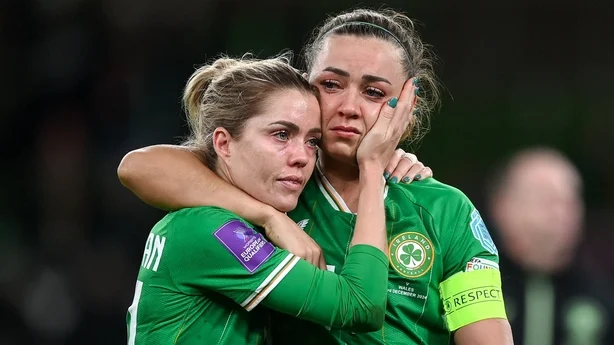
After a hard-fought draw in Cardiff the second leg should have been favourable for the home side, but the Irish team were nervous and off the pace and ultimately outplayed by Rhian Wilkinson’s Wales - a result which ultimately cost Eileen Gleeson her job.
The year ended badly for Heimir Hallgrimsson as well with a humiliating 5-0 defeat at the hands of England at Wembley.
Victories over Finland home and away offer some hope that the new man can learn to negotiate a World Cup campaign that includes teams we are very familiar with including either Portugal or Denmark as top seeds and Hungary and Armenia.
The good thing is that being in a relegation play-off with Bulgaria in March has meant that we are in a four-team group and will not have to play competitively until the autumn when our entire World Cup hopes are squashed into narrow windows in September, October and November.
Let’s hope by then that the Icelandic dentist has figured out how to take away the pain while leaving Irish fans with a smile on their faces as they look ahead to the next World Cup in North America.
The year gone by began with an appearance by the FAI before the Public Accounts Committee which ultimately saw off former CEO Jonathan Hill.
It emerged that a payment made to him in lieu of holidays not taken which he paid back breached the terms of the memorandum of understanding between the government and the FAI.
Hill’s full-time replacement as CEO, David Courell, has a job on his hands to guide the indebted association through choppy waters but a recent vote to narrowly endorse the aligned season as part of the player pathway plan is a positive move within a still divided football community.
One of Courell's first acts as full-time CEO was to express disappointment that Northern Ireland would not feature as a host venue for the European Championships following the news that the Casement Park stadium redevelopment would not be completed in time for the tournament.
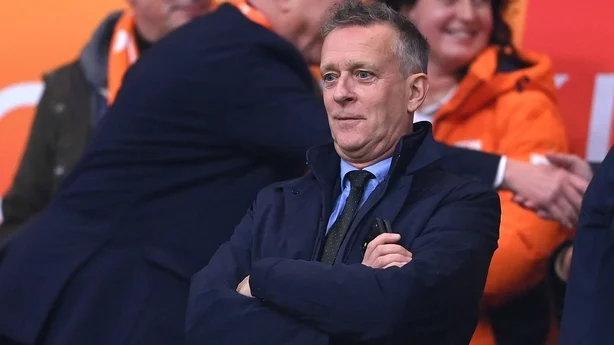
Later in the year it emerged that those Euro 2028 matches originally slated for Casement could still be held in Ireland, but only in the Aviva Stadium thereby dashing any hopes that Croke Park or Páirc Uí Chaoimh could play host to some games.
UEFA took the decision to fall back to a nine-venue solution so any fixtures that were to have gone to Belfast will now be redistributed across the existing venues.
Meanwhile FIFA awarded the 2034 World Cup to Saudi Arabia although many of the proposed stadia are not yet built, and genuine fears exist surrounding the safety of the workers employed to build them and the human rights of people in that country.
And once more the entire football calendar will be disrupted to play the World Cup during winter.
The move was endorsed by "acclamation" with FIFA minions waving their hands around their heads on screens in a scene that could have been out of George Orwell’s 1984.
The air at the upper echelons of international football is rancid.
Down at League of Ireland level, we give thanks for Duffer who cuts through the crap and to the many others involved in the game here who help keep it real.
Can’t wait for the new season to begin.
